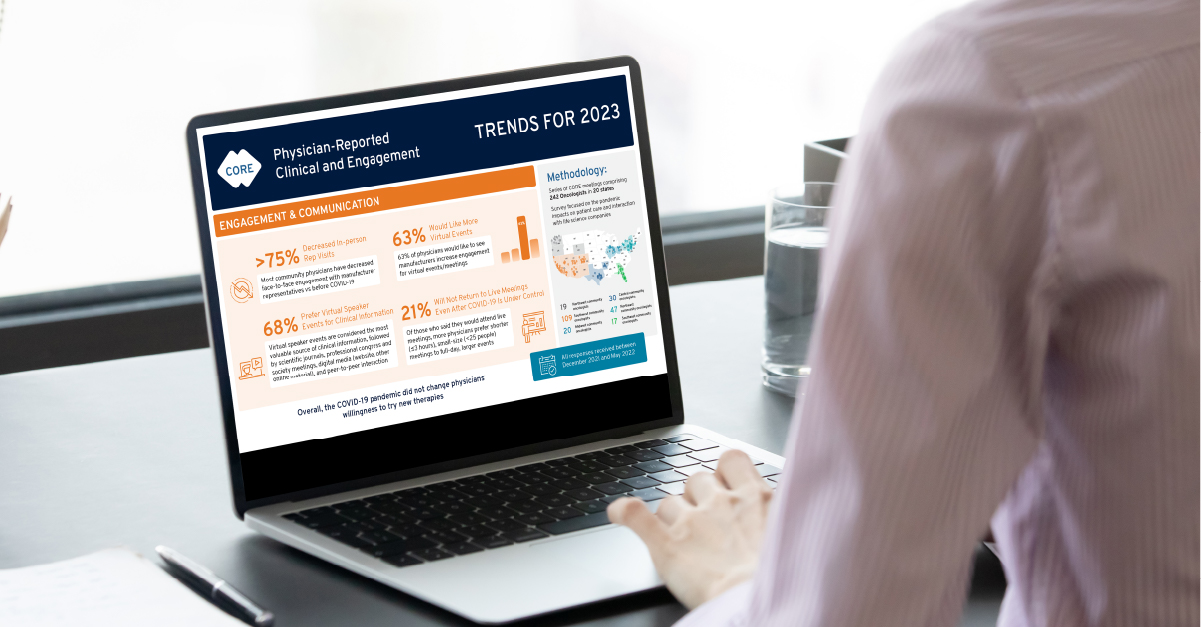As we begin to consider a post-pandemic world, some lasting effects of COVID-19 on clinician preferences are emerging. Aptitude Health conducted a virtual Community Oncology Research Evaluations (CORE) meeting to find out what changes may persist among US community practices post-pandemic. In general, CORE meetings usually include up to 10 community practices from the Axess Network. They feature an expert-led presentation and expert-moderated dialogue, followed by a survey to gain attendee insights. Reports summarizing these events provide an in-depth understanding of patterns of care, treatment choices, practice challenges, and resource needs.
In this recent CORE, the survey focused on the impacts on patient care and life science companies’ access to and engagement with community physicians during the pandemic. There were 242 participants, and all responses were received from December 2021–May 2022. Participants included community oncologists from across the United States, with the largest proportion in the Southwest region.
- Overall, virtual speaker events are the preferred source of clinical information, followed by scientific journals, professional congress and society meetings, digital media (website, other online material), and peer-to-peer interaction
- All but the Central region participants chose virtual speaker events as their top source, but the Central region chose professional congress and society meetings, then virtual events
- 63% of physicians would like to see manufacturers increase virtual events/meetings
- Overall, more than a third (38%) of physicians prefer 1:1 phone/videoconference, a quarter (25%) prefer email communications, and nearly another quarter (24%) prefers representative-coordinated, peer-to-peer interactions when engaging virtually with manufacturer representatives
- Regarding engagement, there has been a reduction in in-person appointments and an increase in virtual-format appointments (8% pre-COVID to 26% currently)
- >75% of community physicians have decreased face-to-face engagement with life science company representatives vs before COVID-19
- 18% of community physicians have paused engagement until COVID-19 is under control
- Over a quarter of the practices in the Northwest region never engaged and will not engage in the future with corporate representatives
- Compared with pre-COVID, currently, there is a significant increase in virtual format appointments to engage with life science company representatives in all regions except the Northeast (no significant change in virtual format; however, one-third paused any engagement) and Southeast regions (lunch appointments are still preferred by most)
- Only half of physicians responded to the question asking which top 3 manufacturers have done a good job creating valuable remote/virtual engagement events. Of those, BMS, AstraZeneca, and Pfizer were mentioned most often
- None of the life science companies stand out for NOT creating valuable remote/virtual engagement events for the community physicians
- Overall, over half of advisors (54%) have not changed their frequency of searching manufacturer websites and/or other digital media to access drug or treatment information
- However, nearly 40% reported searching for information more often now than they used to
- Most respondents answered “unsure” when asked which manufacturers had valuable web/digital media tools. Of the 27% who did answer, BMS, Merck, and Pfizer were cited most frequently
- Overall, ~21% of physicians are unlikely to attend live meetings even after COVID-19 is under control
- Of those who will return to live meetings, some prefer small-sized events and others are comfortable with large-sized meetings
- More physicians prefer shorter live meetings (≤3 hours) to full-day events
- Nearly half of physicians from the Southeast will still prefer virtual meetings after COVID
- Overall, the COVID-19 pandemic did not change physicians’ willingness to try new therapies (86%)
To summarize, even after COVID-19 is under control, most community physicians would like to see life science companies increase their efforts in virtual format events/meetings. Physicians’ most preferred virtual formats to engage with representatives are 1:1 phone/video conferences, virtual peer-to-peer interactions (rep coordinated), and email communications; these may be lasting changes. For the full CORE report, contact Aptitude Health.


